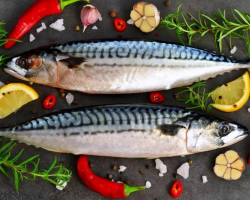Compulsive overeating is a dependence that is difficult to get rid of. It is important not to think about food, eat right and play sports.
Content
- Signs of compulsive overeating
- Drug treatment for compulsive overeating
- Psychotherapy with compulsive overeating
- How to treat compulsive overeating yourself?
- Diet with compulsive overeating. Is it possible to sit on a diet with a disorder of food behavior?
- What is neurogenic bulimia?
- The consequences of neurogenic bulimia
- Bulimia can lead to anorexia?
- How to eat with bulimia? Intuitive nutrition and bulimia
- How to treat compulsive overeating: tips
- Video: Bulimia and compulsive overeating. What to do?
Almost every person can overeat from time to time. A large portion at the festive table or several sweets and cookies with tea during the night watching the film. All this is not critical for the body, but if overeating becomes regular and this turns into an uncontrolled habit - it is dangerous to health. The immense food consumption in a large volume is called compulsive overeating.

Signs of compulsive overeating

Compulsive overeating differs from bulimia in that a person is upset after gluttony and feels guilty. With bulimia, people cause vomiting after eating or taking a laxative.
Compulsive overeating causes a feeling of disgust after eating. A person begins to reproach himself for the fact that he was overeated and could not restrain himself. Depression occurs and a bad mood arises. I would like to eliminate the lack of self -control, but this is impossible to do.

Compulsive overeating occurs when stress appears and I want to seize a bad mood. But such consolation works a short period of time. Reality returns again with hatred and regret about what is happening.
The more often signs of compulsive overeating occur, the more I want to eat. This all turns into a vicious circle, which is difficult to break on its own.
Drug treatment for compulsive overeating

- After a certain examination, the doctor prescribes drug treatment for compulsive overeating. Treatment with drugs can be prescribed at the request of the patient
- First of all, antidepressants are prescribed. It is considered ineffective to take drugs that inhibit appetite. Only dubious sources can recommend them
- The doctor will prescribe medications for the treatment of concomitant diseases - diabetes, high pressure. A profile specialist recommends drugs taking into account the general condition of a person and the presence of pathologies
- If there is obesity, then the doctor prescribes treatment to eliminate this ailment. Conversations are held on proper nutrition, a patient’s lifestyle is being reviewed, and individual sports loads are selected

As auxiliary methods, liposuction or surgery can be carried out to reduce the volume of the stomach. However, without getting rid of psychological problems, the effect will only come for a short period of time.
Psychotherapy with compulsive overeating

Diseases associated with food behavior are successfully treated with psychotherapy. The fight against the habit of overeating, replacing bad habits with healthy, control of emotions and moods, the acquisition of certain skills for managing stressful situations.
To all these aspects of a person, psychotherapy will be able to push in compulsive overeating. Three types of psychotherapeutic treatment are used: behavioral, cognitive psychotherapy, deep hypnosis with suggestion.
How to treat compulsive overeating yourself?

The main emphasis must be placed on your psyche. It is necessary to get rid of daily stress and depression.
Tip: Learn to control your appetite.
It is difficult to do it yourself and therefore many people make mistakes. If there is no time to go to the doctor or do not want to do it, then the question arises, how to treat compulsive overeating yourself? Success will certainly be if you do not make such mistakes:
- compliance with a hard diet. This is contraindicated, since the restriction will lead to a breakdown, and the symptoms will return again

Tip: Avoid diets, but follow the nutrition. Eat more vegetable salads and eat every 2 hours, but in small portions.
- acquisition of a large amount of food and storage of its house
Tip: Protect your body with the distance from food. It is better to go to the supermarket once again than to hammer a refrigerator with food. Put a limited amount of money in the wallet so as not to gain extra food. If there is such an opportunity, then let one of the relatives go to the store for food.
- achieving a quick effect

Tip: If you want to get rid of compulsive overeating, then tune in to long -term treatment. During this time, thinking, attitude to food should change. Realize that a person needs food to maintain health, and not to seize stress.
Diet with compulsive overeating. Is it possible to sit on a diet with a disorder of food behavior?

As mentioned above, any diet causes great harm to the body with compulsive overeating.
Important: Eat correctly. Three times - breakfast, lunch and dinner - the main meals, the rest is a snack (fruit, unsweetened yogurt).
Our body is arranged so that the pancreas, liver, stomach and other digestive organs work when we eat. If you sit on a diet and starve, then the body will have stress, and it will begin to accumulate fat until better times. Therefore, it is unacceptable to sit on a diet, especially with a disorder of food behavior.
What is neurogenic bulimia?

Bulimia or the exact name “neurogenic bulimia” is a disorder of food behavior, which is characterized by a repetition in the cyclic mode of compulsive overeating. A person with such a diagnosis has excessive appetite.
The patient can cause vomiting, carry out the release of the gastrointestinal tract using laxatives or enemas, use diuretics to stimulate defecation, urination and other processes.
People suffering from this disease can exhaust their body with these processes, adding exhausting physical activity to compensate for constant overeating. Bulimics can expose their body to long hunger strikes, which, according to them, are compensation for gluttony.
The consequences of neurogenic bulimia

All manifestations of this disease have their consequences, serious physical problems for the body. These include such manifestations:
- damage to tooth enamel caused by constant effects of gastric juice
- damage to the mucous membrane of the stomach
- heart and vascular pathologies
- hemorrhage from the stomach to the throat
- problems with vocal cords
- eye diseases and skin
- hair loss

Often people begin to fight the consequences of neurogenic bulimia, but it is important to get rid of the underlying disease and the causes that cause it. Bulimik may not consult a doctor independently, because such a disease is a dependence that stands along with alcohol or drug addiction. A person may not understand that he is sick, so he needs to help.
Important: prejudices and instructions of relatives will not help. It is necessary to consult a specialist who will correctly make a diagnosis and prescribe treatment correctly selected for a particular patient.
Bulimia can lead to anorexia?

In patients with bulimia and anorexia, control of their weight turns into an important life goal. This is a threatening way to solve your problems. Bulimia can lead to anorexia, if you do not conduct professional treatment of this disease.
Bulimik often sits on exhausting diets and this will ultimately lead to a heavy anorexia, even with death. Just as bulimia can lead to anorexia, and anorexia can lead to bulimia if you do not take the necessary measures to recover.
Important: do not self -medicate! Contact a specialist, because only a professional will be able to find the true cause of the disease and forever save a person from him.
How to eat with bulimia? Intuitive nutrition and bulimia

Learning to eat correctly is much more difficult than starving or overeating. Do not get hung up on food, and ask yourself how to eat with bulimia. Food should be close to physiologically adequate, that is, how much energy is spent, he must replenish with food.
Tip: Try to first slightly reduce the calorie content of your food-100-200 kcal. Weight correction will occur, but you will not experience hunger, and will not break into a new dose of gluttony.
An important for a person will be the introduction of intuitive nutrition for bulimia. Previously, when we were babies, no one taught us how to eat. The child eats when a physiological need arises in this. He is as much as he needs.
Later, mothers, dads, grandfathers and grandmother are instilled in the baby to the baby, but this is wrong. Such a second stage of human acquaintance with food involves the presence of dense dinners, grandmother's pies and a lot of sweets. But the most faithful was the first stage - intuitive, after birth. This is the most faithful and real proper nutrition!

Then a person grows up and understands that he can afford to buy everything - any food. Gathering with friends and festive feasts begin. All this leads to digestive problems, and food disorders occur. Therefore, it is important to eat at the level of intuition. It is necessary to eat if a real feeling of hunger appears.
Important: eat food in such quantities as to quench hunger a little, and not fill the stomach to failure or until pain appears.
How to treat compulsive overeating: tips

Almost every person loves to enjoy food in large quantities. This unsafe habit leads to problems, from which it is impossible to get rid of. Many people wonder how to treat compulsive overeating?
Someone finds salvation with a psychotherapist or hypnologist who gives the correct installations. Others are trying to change something in their heads on their own, getting rid of stress and depression, returning to normal life. Everyone finds his own way!
The advice of people who have gone through this and their reviews about one form or another of treatment will help to avoid negative consequences for the body and help themselves.
Tip: stop sitting on diets and do not think about food. Do not blame yourself after gluttony.
Important: in the first six months of treatment, disruptions are considered a normal phenomenon, then they will disappear completely.
Tip: Get rid of the desire to lose weight, want to recover! Take antidepressants prescribed by a doctor to calm down. Get out and less stress.

Tip: Eat correctly, in small portions - no more handful. Exclude sweet, spices, smoked foods and salt. Do not force yourself to drink green tea - drink purified water. Add walking or light running in the morning. In a month, start running in the stadium.
There is a well -known statement: "A person must eat to live, and not live in order to eat." Remember this, and everything will be fine!








It seems to me that with all the disorders of food behavior it is worth going to psychotherapy. And if the goal is just to lose weight, that is, there are many ways to motivate 🙂 I had overeating from stress and when I saw +10 kg on the scales on one permanent day, I realized that I had to do something. At first I just went to the gym, went regularly, but the weight did not particularly leave. Then she decided to take food, began to record everything eaten and count calories. By the way, all sorts of Yazio -like applications help ( https://www.yazio.com/en/weight-tracker) or similar, you do not have to calculate the calorie content of each dish. In general, when I managed to stay in the framework of 1800 kcal (I calculated in the application the calorie content that is needed to lose weight), then the weight began to fall steadily. Well, I did not leave the gym, and continued to engage. So I really advise those who also suffer from a similar problem 🙂